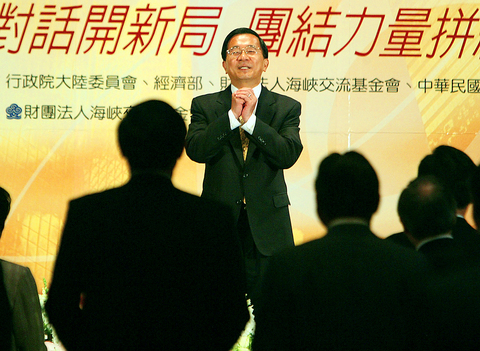Following the operation of cross-strait charter passenger flights over the New Year holiday, top cross-strait policymakers yesterday said they were prepared to take one step further and discuss the possibility of relaxing regulations on chartered cargo flights with Beijing.
"Nothing is impossible if both sides are sincere ? as long as China is willing to sit down and negotiate matters [with Taiwan,] no topic is off limits," President Chen Shui-bian (陳水扁) said yesterday.

PHOTO: CNA
Chen spoke yesterday at an annual New Year's gathering of taishang, or Taiwanese business-people investing in China. He said that he had three wishes for the new year, saying that he hoped taishang would meet with success in the coming year, that plans to make cross-strait cargo transit more convenient could be realized and that the Committee for Cross-Strait Peace and Development (
Mainland Affairs Council (MAC) Chairman Joseph Wu (
According to policies drawn up last year, the MAC allows for 360 scheduled charter cargo flights a year. In addition, special chartered cargo flights can be arranged to meet the needs of specific shippers, but these flights are not to exceed the number of scheduled flights that year.
Taishang have long lobbied for the government to lift restrictions on cross-strait air links, saying cargo flights could cut transportation costs for businesses on both sides of the Strait, but the recent precedent set by negotiations for the Lunar New Year chartered flights has created new possibilities for cargo flight plans.
"Negotiations for Lunar New Year passenger charter flights were successful. Cargo chartered flights shouldn't be too difficult," Wu said.
"Negotiations for cargo and passenger chartered flights would be the same. There has to be a government representative present. No matter the capacity of that government official at the negotiations, he or she would still be a government official," Wu said.
Transportation officials Billy Chang (
However, Wu warned that China's proposed anti-secession bill could stand in the way of increased cooperation between the two foes, reiterating that Beijing's legislative move could force Taiwanese people to express their opposition by conducting a referendum.
Premier Frank Hsieh (
About 230 taishang were present yesterday.

Alain Robert, known as the "French Spider-Man," praised Alex Honnold as exceptionally well-prepared after the US climber completed a free solo ascent of Taipei 101 yesterday. Robert said Honnold's ascent of the 508m-tall skyscraper in just more than one-and-a-half hours without using safety ropes or equipment was a remarkable achievement. "This is my life," he said in an interview conducted in French, adding that he liked the feeling of being "on the edge of danger." The 63-year-old Frenchman climbed Taipei 101 using ropes in December 2004, taking about four hours to reach the top. On a one-to-10 scale of difficulty, Robert said Taipei 101

Nipah virus infection is to be officially listed as a category 5 notifiable infectious disease in Taiwan in March, while clinical treatment guidelines are being formulated, the Centers for Disease Control (CDC) said yesterday. With Nipah infections being reported in other countries and considering its relatively high fatality rate, the centers on Jan. 16 announced that it would be listed as a notifiable infectious disease to bolster the nation’s systematic early warning system and increase public awareness, the CDC said. Bangladesh reported four fatal cases last year in separate districts, with three linked to raw date palm sap consumption, CDC Epidemic Intelligence

Two Taiwanese prosecutors were questioned by Chinese security personnel at their hotel during a trip to China’s Henan Province this month, the Mainland Affairs Council (MAC) said yesterday. The officers had personal information on the prosecutors, including “when they were assigned to their posts, their work locations and job titles,” MAC Deputy Minister and spokesman Liang Wen-chieh (梁文傑) said. On top of asking about their agencies and positions, the officers also questioned the prosecutors about the Cross-Strait Joint Crime-Fighting and Judicial Mutual Assistance Agreement, a pact that serves as the framework for Taiwan-China cooperation on combating crime and providing judicial assistance, Liang

US climber Alex Honnold left Taiwan this morning a day after completing a free-solo ascent of Taipei 101, a feat that drew cheers from onlookers and gained widespread international attention. Honnold yesterday scaled the 101-story skyscraper without a rope or safety harness. The climb — the highest urban free-solo ascent ever attempted — took just more than 90 minutes and was streamed live on Netflix. It was covered by major international news outlets including CNN, the New York Times, the Guardian and the Wall Street Journal. As Honnold prepared to leave Taiwan today, he attracted a crowd when he and his wife, Sanni,